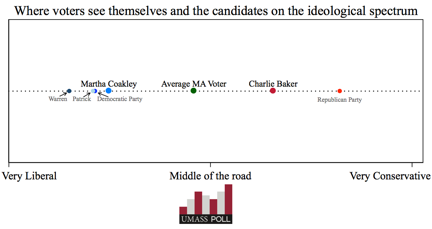Our friends and colleagues at the University of Massachusetts at Amherst performed the only exit poll of the 2014 election for the UMass poll. Below we offer a post from two of their students. Cameron Roche is a PhD graduate student at the University of Massachusetts, Amherst. He is an Assistant Director of the UMass Poll and is a research assistant on the NSF Cooperative Congressional Election Survey (CCES). Jackson Maxwell is an undergraduate research assistant for UMass Poll. He is a political science and history dual major at the University of Massachusetts, Amherst.
The 2014 Massachusetts gubernatorial race between Charlie Baker and Martha Coakley ended with a photo finish. Earlier this year, it looked to be an easy victory for Coakley, but it quickly turned into a far closer race.
Coakley and Baker consistently traded leads in polls throughout much of September and October, often polling within the margin of error of each other. Then, on October 24th, a Boston Globe poll showed Baker with a shocking 9-point lead.[1] On Election Night, Baker prevailed by the ever-so-slim margin of 40,361 votes, out of the over 2.1 million that were cast.[2] With such a small margin of victory, one inevitably looks towards the demographics from which those key votes came from.
Baker, a moderate Republican who lost to incumbent governor Deval Patrick in the 2010 gubernatorial election, focused much of his campaign on fiscal issues, where he had a distinct edge over Coakley. UMass Poll found that 43% of voters trusted Baker more with economy, as opposed to Coakley’s 36% tally. Baker also toned down the attacks on President Obama that turned off voters from his 2010 campaign, and successfully molded himself into a more personable candidate. This was another Achilles heel for Coakley, who struggled to connect with voters during her unsuccessful 2010 campaign for the Senate seat vacated by the late Ted Kennedy.
Although Coakley distinguished herself from more progressive candidates like Steve Grossman in the Democratic primary, she was still seen by the electorate as being farther to the left than Baker was to the right, a phenomenon illustrated in Figure 1. UMass Poll found that 22% of voters viewed Coakley as "very liberal,” while only 4% saw Baker as “very conservative.”

Although a Republican tidal wave seemed to sweep the nation, there were more specific reasons why Charlie Baker was able to win the governor’s race in a state that President Obama won by 23 points in 2012. UMass Poll data revealed that the gender gap, and the support of independent and moderate voters were the key factors in Baker’s slim victory.
In a state with over 2.2 million voters who are registered as “unaffiliated,” and over three times as many registered Democrats as there are Republicans, Baker needed the help of both moderate and independent voters to win. UMass Poll data revealed that Baker won the vote of those who identified as “moderate” by 24% , taking 60% of the vote to Coakley’s 36%. Independents, so key in any election, also backed Baker definitively. Exit poll data revealed that Baker won the vote of those who identified as “independent” by 32%, taking 63% of the vote to Coakley’s 31%. Although Baker also won the majority of the independent vote in the 2010 election, the 32% margin of victory he achieved in 2014 more than doubled his 2010 margin.
Women played another key role in Baker’s victory. In his 2010 loss to Deval Patrick, Baker lost the female vote by 25 points.[3] And although Coakley did manage to win a majority of the female vote, it was not as large as the 2010 margin, nor was it enough to offset Baker’s major advantage in the male vote. As Baker was ahead among men by 17%, Coakley needed, and was hoping for, a huge advantage in votes from women, but only beat Baker by 11%; taking 53% of women compared to Baker's 42%.
Coakley needed the full support of both women and independents to pull out a victory on election night. While she managed to gain a small majority of female voters, her tally fell short of the gap Deval Patrick achieved in 2010. Baker also ran the table with independent voters, more than doubling up on Coakley’s total. With those two demographics in hand, Baker was able to procure just the amount of votes he needed to avenge his 2010 loss.[1] http://www.bostonglobe.com/metro/2014/10/23/baker-pulling-away-from-coakley-new-poll/t1UAIVNm4FWE9i31bf6YTM/story.html?comments=all&sort=OLDEST_CREATE_DT
[2] http://www.politico.com/2014-election/results/map/governor/massachusetts/#.VGj7NFcXQfk
[3] http://people.umass.edu/schaffne/Site/2010_MA_Exit_Poll.html

